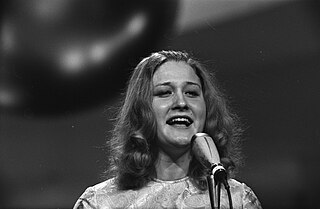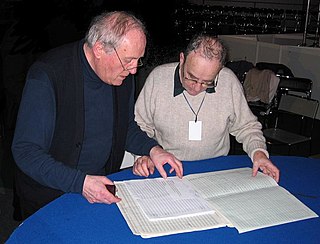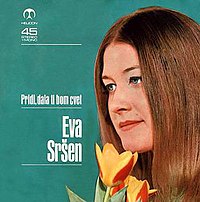
Slovenia has participated in the Eurovision Song Contest 29 times since its debut in 1993, having hosted a qualification round in Ljubljana for seven countries due to the influx of new nations wishing to join the Eurovision Song Contest. Having only missed the event twice in 1994 and 2000 due to the relegation rule after a poor average score in the 1990s, Slovenia's best result is seventh position achieved on two occasions; in 1995 with "Prisluhni mi" performed by Darja Švajger and in 2001 with Nuša Derenda and "Energy". Since the introduction of the semi-finals in 2004, Slovenia has qualified for the final on eight occasions. As of 2024, Slovenia has not made it to the top ten since their seventh place finish in 2001, only making it to the thirteenth position in 2002 and 2011.

The State Union of Serbia and Montenegro participated in the Eurovision Song Contest twice: in 2004 and in 2005. Their debut appearance was a success, with the song "Lane moje" performed by Željko Joksimović finishing second. The following year, they placed seventh, courtesy of the band No Name with the song "Zauvijek moja". Following the 2006 Montenegrin independence referendum, Serbia and Montenegro have participated in the contest as separate entities, making their independent debuts in 2007.

Serbia has participated in the Eurovision Song Contest 16 times since making its debut in 2007. Serbia previously participated as part of Yugoslavia and as Serbia and Montenegro (2004–2006). Serbia won the contest on its debut as an independent country in 2007, with "Molitva" by Marija Šerifović. The country's other top five results are third place in 2012 with "Nije ljubav stvar" by Željko Joksimović, and fifth place in 2022 with "In corpore sano" by Konstrakta. Serbia's other top ten results are sixth place (2008) and tenth place (2015).
"Occhi di ragazza" was the Italian entry in the Eurovision Song Contest 1970, performed in Italian by Gianni Morandi.
Slovenia participated in the Eurovision Song Contest 2007 with the song "Cvet z juga" written by Andrej Babić. The song was performed by Alenka Gotar. Slovenian broadcaster Radiotelevizija Slovenija organised the national final EMA 2007 in order to select the Slovenian entry for the 2007 contest in Helsinki, Finland. 24 entries competed in the national final which consisted of three shows: two semi-finals and a final. The top seven entries were selected to advance from each semi-final based on a public televote. Fourteen entries qualified to compete in the final where the winner was selected over two rounds of public televoting. In the first round, the top two entries were selected. In the second round, "Cvet z juga" performed by Alenka Gotar was selected as the winner entirely by a public televote.

Alenka Gotar is a Slovene soprano singer, born in Rodica in 1977. With the song "Cvet z juga", she represented Slovenia in the Eurovision Song Contest 2007 in Helsinki, Finland. Achieving seventh place in the semi-final, she became the first Slovene to qualify to the grand final, where she ended fifteenth with 66 points.
Yugoslavia participated in the Eurovision Song Contest 1991 with the song "Brazil", written by Zoran Vračrvić and Dragana Šarić. The song was performed by Bebi Dol. The Yugoslav national broadcaster, JRT, organized a national final, JRT izbor za pjesmu Evrovizije – Sarajevo '91, to select its entry for the contest held in Rome, Italy. This was Yugoslavia's penultimate Eurovision entry in the Eurovision Song Contest.

Eva Sršen is a Slovenian singer, who had a short career in Yugoslav pop music in the first half of the 1970s.
Slovenia made its debut to the Eurovision Song Contest in 1993, having previously competed as part of Yugoslavia. The Slovene broadcaster Radiotelevizija Slovenija (RTVSLO) held a national final to select the first independent Slovene entry for the Eurovision Song Contest.
Bosnia and Herzegovina made their début at the Eurovision Song Contest 1993 in Millstreet, Ireland. Fazla represented Bosnia and Herzegovina with the song "Sva bol svijeta". The song describes the Bosnian War occurring at that time in Bosnia and Herzegovina. They finished in 16th place with 27 points.

Igor Cukrov is a Croatian singer-songwriter, musician and television personality. He came to media attention as one of sixteen contestants of talents show Operacija trijumf, Balkan version of Endemol's Star Academy. Cukrov represented Croatia in the Eurovision Song Contest 2009, alongside Andrea Šušnjara, with the song "Lijepa Tena", written by Tonči Huljić. The song qualified to the final from the second semi-final as the jury's selected qualifier. It eventually finished in the 18th place with 45 points.
Ireland participated in and won the Eurovision Song Contest 1970 with the song "All Kinds of Everything" performed by Dana. John Skehan was the spokesperson for Ireland in the Contest. Valerie McGovern commentated on RTÉ One, and Kevin Roche on RTÉ Radio 1.
Slovenia participated in the Eurovision Song Contest 2012 with the song "Verjamem" written by Vladimir Graić, Hari Mata Hari and Igor Pirkovič. The song was performed by Eva Boto. Songwriter Hari Mata Hari represented Bosnia and Herzegovina in the Eurovision Song Contest 2006 with the song "Lejla" where he placed third in the grand final of the competition. Slovenian broadcaster Radiotelevizija Slovenija organised the national final Misija EMA 2012 in order to select the Slovenian entry for the 2012 contest in Baku, Azerbaijan. 32 performers competed in the first stage of the national final, Misija Evrovizija, from which two artists qualified to compete in Misija EMA 2012 following a five-month-long competition. In Misija EMA 2012, the winner was selected over two rounds of voting. In the first round, each artist performed three songs and one song were selected for each performer following the combination of votes from a four-member jury panel and a public televote. In the second round, "Verjamem" performed by Eva Boto was selected as the winner entirely by a public televote.
Slovenia participated in the Eurovision Song Contest 2013 with the song "Straight into Love" written by Hannah Mancini, Gregor Zemljič, Erik Margan, Matija Rodić and Marko Primužak. The song was performed by Hannah, who was internally selected by Slovenian broadcaster Radiotelevizija Slovenija to represent Slovenia at the 2013 contest in Malmö, Sweden. Hannah was announced at the Slovenian representative on 1 February 2013, while the song, "Straight into Love", was presented to the public on 14 February 2013.
Serbia participated in the Eurovision Song Contest 2016 with the song "Goodbye (Shelter)" written by Ivana Peters. The song was performed by Sanja Vučić Zaa, who was internally selected by the Serbian national broadcaster, Radio Television of Serbia (RTS) to represent Serbia in the 2016 contest in Stockholm, Sweden. Vučić was announced as the Serbian representative on 5 March 2016, while the song, "Goodbye (Shelter)", was presented on 12 March 2016 during a show titled Pesma Srbije za Evropu.
Slovenia participated in the Eurovision Song Contest 2017 with the song "On My Way" written and performed by Omar Naber, who had previously represented Slovenia in the Eurovision Song Contest in 2005 where he failed to qualify to the final with the song "Stop". Slovenian broadcaster Radiotelevizija Slovenija organised the national selection EMA 2017 in order to select the Slovenian entry for the 2017 contest in Kyiv, Ukraine. 16 entries competed in the national final which consisted of three shows: two semi-finals and a final. Entries were selected to advance from each semi-final based on a public televote and a jury panel. Eight entries qualified to compete in the final where "On My Way" performed by Omar Naber was selected as the winner following the combination of votes from six regional juries and a public televote.
Yugoslavia was present at the Eurovision Song Contest 1970, held in Amsterdam, Netherlands.

Mojmir "Mojzes" Sepe was a Slovenian composer, conductor, arranger and trumpeter.
Serbia participated in the Eurovision Song Contest 2022 in Turin, Italy, with "In corpore sano" performed by Konstrakta. The Serbian national broadcaster Radio Television of Serbia (RTS) organised the national final Pesma za Evroviziju '22 in order to select the Serbian entry for the 2022 contest. It was the first entry in the Eurovision Song Contest to contain a verse in Latin.
Serbia participated in the Eurovision Song Contest 2023 in Liverpool, United Kingdom, with "Samo mi se spava" performed by Luke Black. The Serbian national broadcaster, Radio Television of Serbia (RTS), organised the national final Pesma za Evroviziju '23 in order to select the Serbian entry for the 2023 contest. The final took place on 4 March 2023, with a combination of jury voting and televoting selecting Black to represent Serbia at the 2023 contest in Liverpool.







